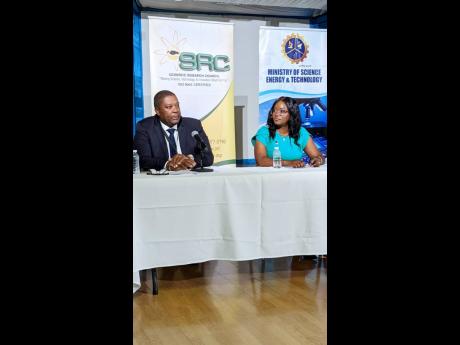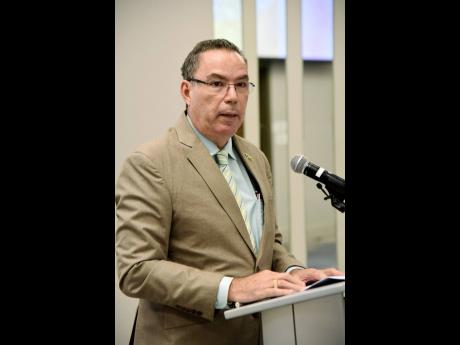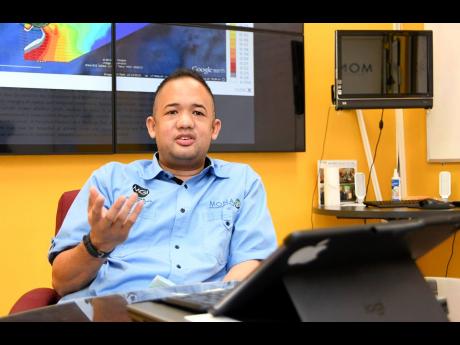Jamaica moving towards nuclear energy
From using gamma irradiation technology to curtail mosquito spread to employing nuclear energy to power homes and call centres, industry players last week outlined a slew of initiatives they say will bolster life for Jamaicans while making science and technology more relatable to the populace.
There is a long way to go; and it means more hands-on interaction, particularly with the youth, but a Ministry of Science, Energy and Technology round-table talk on Thursday signalled what is expected to be the start of a more meaningful engagement with members of the public about local scientific opportunities.
“The technique is called the sterile insect technique,” explained Professor Charles Grant, director general of the International Centre for Environmental and Nuclear Science at The University of the West Indies (UWI), outlining the novel mosquito-reduction initiative using gamma radiation technology.
The said radiation technology, he said, can also be used to improve Jamaica’s agricultural crops, increasing the quality and yield, as well as increasing the shelf life of items for export. Grant listed, as examples, locally produced mangoes, tomatoes, and other seasonal fruits that often go to waste due to bacteria and pests.
“We are going to mass rear mosquitoes. We will then selectively separate the males from females, and then radiate them with just a little amount of radiation to make them infertile. It is like giving them birth control,” explained Grant, citing the Aedes aegypti, the females of which are responsible for transmitting a slew of diseases, including dengue, chikungunya and the Zika virus.
“Then we release the male mosquitoes and then they compete with the wild mosquitoes to mate. The only thing is that when they mate, the eggs will not come to fruition,” he said, noting the positive impact on the health sector.
Being implemented in partnership with the Ministry of Health and Wellness as well as other local and international agencies and funders, the technique has already been used in parts of the world, including China.
The health ministry will select the communities in which to roll out a pilot project in about two years from now, Grant said, adding that the project should cost about US$2 million.
The irradiation unit was conceptualised four years ago. Approved by the Government, it is currently being tailored to meet Jamaica’s needs with a price tag of one million euros. The majority of the cost is being borne by the International Atomic Energy Agency.
LONG-TERM SOLUTION
For the last four decades, Jamaica has been operating a nuclear reactor mainly for research purposes.
The idea may come as startling to many Jamaicans who think the technology is unsafe based on history, the experts explain. But nuclear technology has seen much improvement, and while Minister of Science, Energy and Technology Daryl Vaz confirmed the Government’s exploration of nuclear energy, it is a plan for the long-term solution to the island’s energy issues, he said.
“Having ran a nuclear reactor here for the last 40 years safely and securely is the basic foundation for the step, I think, we can take and that is the introduction of nuclear power to Jamaica,” Vaz said last week.
“The larger reactors that the industrial nations built were way too large for us; one single reactor could run most of the Caribbean.
“With these newer reactors, the thinking is to break these larger reactors up into smaller modules ... so I am looking forward to a bright future in having nuclear energy here. I believe in renewables, but unfortunately, renewables alone cannot carry the baseload and are not always available.”
He continued, “We have had discussions internally and with some of our partners in Canada to understand and get a better feel of the possibilities of nuclear. It is something that we do believe any country like Jamaica would have to think of for energy security in the future.”
BRING SCIENCE DOWN TO EARTH
According to Dr Parris Lyew-Ayee Jr, executive director of the Mona GeoInformatics Institute at UWI and vice-president of the Private Sector Organisation of Jamaica, “Scientists need to stop talking with marbles in their mouths, talking enigmatically and sophisticatedly. We need to communicate this to the common person because we are also humans. We need to stop making science feel so exotic and to bring it down to earth.
“Part of what my remit is at the ministry is to stop this type of future talking, and roll up your sleeves and get dirty. The challenge we will always have is that these things take time, more than the typical political life cycle. People need to be patient, but we need to continue to invest in our people and make well-paying jobs available that we can easily recruit and retain people,” he said.
“Without the people element, both staff and consumers, everything gets chopped off at the knees. We cannot think about equipment and facilities and forget the people part of it.”



